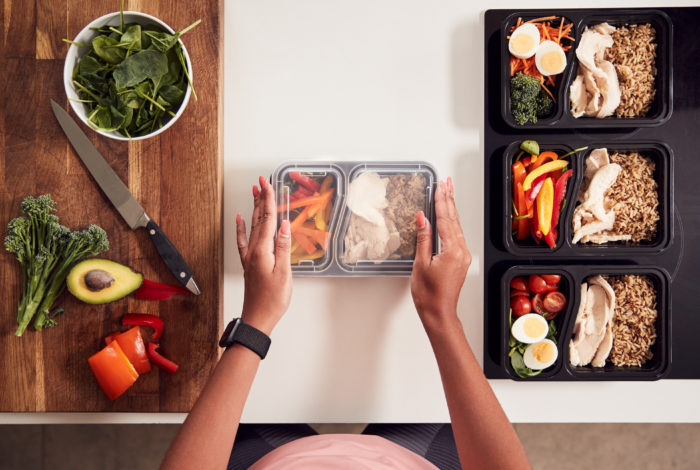A Note for Our Readers
I no longer offer 1:1 nutrition or functional health services, and I’m not accepting new clients for digestive or hormone-related support. This blog remains published as a helpful resource for women navigating these health challenges — especially those looking for clarity around their symptoms and well-being.
Today, my work is dedicated to helping Health Coaches, Practitioners, and Wellness Entrepreneurs grow profitable, sustainable businesses through private practice coaching and mentorship.
If you’re a wellness professional who’s ready to grow a thriving, values-aligned business without burning out, click here to learn more about my coaching programs.
And if you’re ready to build the kind of online health business that nourishes you financially, emotionally, and energetically, check out my signature program, the Nourished Business Accelerator™.
Thank you for being here and I wish you the best on your journey.
Are you working out and unintentionally gaining weight? Keep reading to learn why your new weight loss routine could be keeping you from dropping those pounds.
So you’ve started a new workout routine to see if you could shed a few extra pounds. But a few weeks in, and you’ve noticed the number on the scale going up, not down. What gives?
Trust me, you’re not alone. I’ve worked with plenty of women who, when they started working out or ramp up their activity, started gaining weight instead of losing it.
This can be so frustrating. Especially if you’re following a prescribed training plan that has supposedly worked for other women. You might be wondering if there is something uniquely wrong with your body that you are seeing the opposite results than your goals.
The truth is, this is a common experience for many women. And as more and more quick-fix diet and exercise programs are marketed on a daily basis, the number of women experiencing weight gain from increased exercise is going up every day.
And you could actually be sabotaging your body’s ability to lose weight with these supposedly “ideal” training and diet regimens.
But you don’t have to be stuck in this frustrating cycle. There is a way to exercise that won’t cause your body to store more fat if your goal is to get leaner.
In this article, you’ll learn the top three reasons why you’re working out and still gaining weight. I’ll give you some tips on how to overcome these pitfalls so you can have an effective and rewarding fitness routine that helps you reach your body composition goals in a safe and healthy way.

The “Bulky” Myth of Weight Gain
Before we get into the reasons why you might be gaining weight while working out, I want to bust a big fitness myth.
Many women falsely believe that lifting heavy weights will make them get “bulky.”
It’s true that muscle weighs more than fat. So if you’re building muscle, regardless of what happens to your body fat levels, you might see an increased number on the scale.
But it takes some serious dedication (plus abnormal or artificial levels of testosterone) for most women to gain significant amounts of weight and muscle mass from lifting.
While you may likely see some noticeable muscle mass development, most women can’t get “bulky” without a lot of hard work, a surplus of calories and protein, and maybe even some hormone therapy.
It’s entirely possible that any and all weight gain you do see is from additional healthy muscle mass that you’re putting on. And sadly, having bigger muscles than before can cause some women to feel self-conscious in a world that often glorifies skinniness over strength or health.
I don’t want you to let the fear of getting “bulky” keep you from a beneficial weight training practice. Lifting weights has so many health benefits and is an excellent way to lose excess body fat in a healthy way.
And if weight loss is your goal, you don’t need to fear that you’ll hold on to those extra pounds if you choose to lift weights as your main form of training. Weight lifting can be a great way to see improvements in your overall body composition without having to devote your life to your training routine.
The high intensity of training with heavy weights actually promotes a greater post-exercise calorie burn than cardio does. Plus, varying your training helps avoid the dreaded weight loss plateau and keeps you motivated.
So yes, it’s highly possible that lifting weights will lead to an increase in the number on the scale. But I want you to remember two things.
One, the number on the scale means nothing about your health, appearance, or how you feel about yourself. It only has the meaning that YOU give it, which means you can choose to be happy no matter what that number says.
And two, if your goal is improved body composition and overall better health, then lifting weights and gaining muscle is far better than trying to keep your muscle mass (and the number on the scale) low.
Now that we’ve addressed this common misconception, let’s discuss three mistakes you might be making in your routine that can cause you to gain body fat despite an increased level of exercise.

3 Mistakes that Lead to Gaining Weight While Working Out

Optimize Your Diet
Are You Eating Too Little?
Believe it or not, eating too little can prevent you from losing weight and can even result in weight gain over time.
Crash diets and living on nothing but lean protein and nonstarchy vegetables may work for fat loss in the short run. But in my experience, restricting your food intake so severely isn’t a sustainable or safe way to lose weight over the long run.
Diets that are too low in calories for your needs actually decrease the number of calories your body burns by as much as 23%. Adding intense training to that causes an additional metabolic suppression effect, along with many other problematic symptoms like impaired athletic performance and mood disturbances.
Would you like to save this post?
Your email address is 100% safe and will never be sent spam.
So, if you’re undereating and crushing yourself at the gym, your body might be holding onto those calories out of fear of starvation.
Eating more will give your body the fuel it needs to perform better in your workouts AND to start dropping weight if that’s what it needs to be healthy.
(For more help with undereating check out my eBook, Overcoming Undereating!)
Are You Eating Too Much?
While some diet gurus say calories don’t count, the fact is that any diet that will lead to fat loss is going to create a calorie deficit, whether on purpose or by accident.
Naturally, our bodies don’t like to be in a calorie deficit and a healthy body will feel somewhat uncomfortable or unpleasant when its caloric needs aren’t being met.
It’s challenging to eat in a deficit, and while there are strategies that can help reduce how unpleasant a deficit can feel, it’s unlikely that an effective fat loss diet will feel “effortless.”
In addition to our general aversion to being hungry, many people who increase their exercise levels overestimate how many calories they’ve burned in their workout, and use their training to justify a larger amount of food intake.
I’ve been there before – you have a sweaty workout and decide to have a dessert to treat yourself, and before you know it any calories you’ve burned from working out have been more than replaced by your food intake!
Or perhaps you’re dieting during the week but letting yourself have “cheat days” on the weekends. Over time, that cheat day might snowball into two, then maybe Friday through Sunday becomes a food and drink free-for-all.
By the time you notice it, your cheat days may leave you eating more calories on the weekends than you ever cut out during the week, which can easily cause fat gain!
This isn’t meant to make you feel embarrassed or ashamed. This is completely normal human behavior and if you’re engaging in it, it doesn’t say anything about you as a person or your ability to stick to your goals.
But having awareness of this tendency can help you adjust your behavior and your choices so that you see progress towards your goals, rather than constantly feeling frustrated or confused.
When it comes to fat loss, calories really are “king”. And if you’re working out but still gaining weight, you could be eating more than what your body needs on a daily basis.

Check Your Training Routine
Are You Working Out Too Little?
-
The type of training you’re doing
-
Your level of effort
-
The time you spend exercising
-
Your current weight
-
Your current metabolism
So, if you’re training too little, whether that be in effort or in time spent in the gym, you might not lose any weight.
Keep in mind, your diet plays a far bigger role than exercise when it comes to being in a calorie deficit. But your training routine can definitely help make that deficit happen while also allowing you to eat more food and increasing your metabolic rate overall.
If you’re not doing much exercise, not only do you have to eat far less to see fat loss happen, you also are more likely to lose muscle and fat at the same rate, leading to a lower number on the scale but not necessarily better health or body composition.
The type of training you choose also matters when it comes to successful fat loss.
Doing tons of calorie-burning cardio isn’t the only way to shed body fat, and it’s actually not even the best way for most women.
In fact, if you hate doing cardio but think it’s the only way to lose weight, that alone could keep you from losing extra body fat. If cardio isn’t something you’ll stick to long term, you’re better off minimizing it or skipping it altogether.
It’s true that you don’t burn as many calories lifting weights as you do with long-duration cardio like running. But you actually get a greater post-exercise calorie burn from a higher intensity training style like lifting compared to long-duration cardio. This increased overall caloric burn can have a bigger impact on your fat loss goals than the calories you burn during exercise.
So, if you’re working out but still gaining weight, ask yourself if you’re training enough or in the right way to burn fat and improve your body composition.
If you’re feeling unmotivated to exercise, try varying your workouts to prevent mental burnout and physical plateau, or pick a style of movement that’s simply fun for you, even if it’s not the most effective fat loss training style.
While diet is the most important factor for fat loss, you can get a lot of benefit from a consistent and effective training routine. Be honest with yourself if your workouts have been inconsistent or lackluster, and think about making small tweaks that can make your training more effective.

Are You Working Out Too Much?

Check Your Stress Levels

What to Focus on Instead of the Scale
-
What is one positive change in your body you noticed this week that you didn’t last week?
-
How does your body FEEL?
-
How is your mood? Are you happy with your current routine and lifestyle?
-
How is your energy level? Can you do things that you couldn’t before?
-
Are you having fun with your exercise routine? Are you enjoying your food?

Next Steps in Your Weight Loss Journey
Sometimes the smallest tweak to your diet or training routine can be all it takes to enable weight loss. And other times your body needs to hold onto that weight you perceive as “extra” for one reason or another.
If you’re feeling stuck and frustrated, you may want to work with a qualified nutritionist and coach to help you figure out why you’re still gaining weight even when you’re working out.
Getting an outside perspective on your health and current fitness routine can help you get on the right track to not only lose weight but also to better physical and mental wellbeing.
If you want to team up with me to tackle your weight loss goals you can sign up for a strategy session here.
We’ll dig into your lifestyle, training routine, and health history to come up with the best plan for your unique needs. And whether that plan involves weight loss or not, I guarantee you’ll leave feeling more empowered and encouraged about your health than before!
Have you ever started working out only to experience weight gain? Were you able to tweak your routine to start losing weight? Share your experience in the comments!
This post may contain affiliate links. If you click on a link and make a purchase, I may receive a small commission.


+ show Comments
- Hide Comments
add a comment